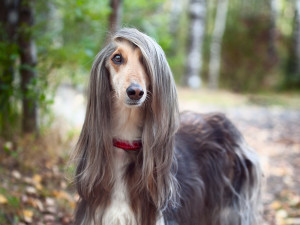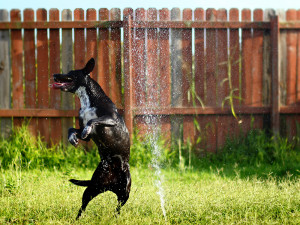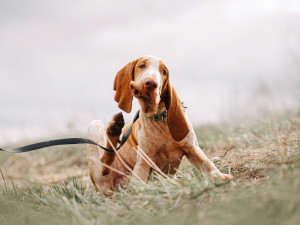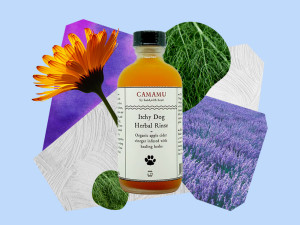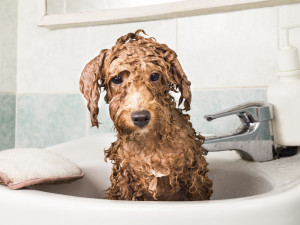What to Do When Your Pup Reeks of Skunk Spray
Learn how to get skunk smell off dogs—because plugging up your nose isn’t gonna cut it.
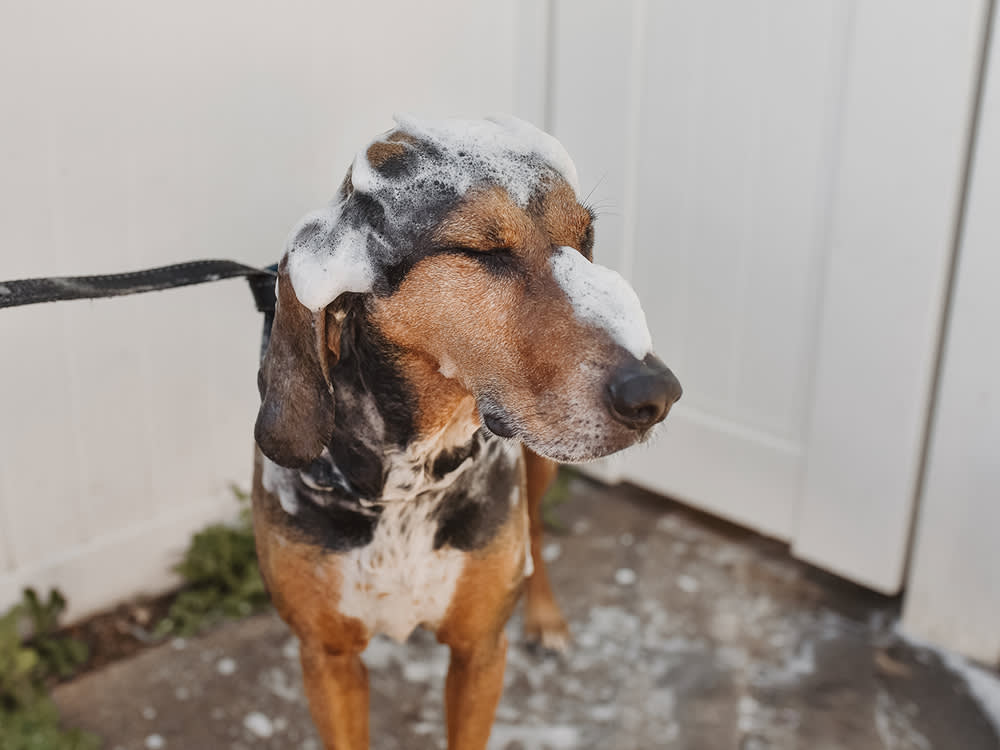
Share Article
“Skunk spray.” Those might be two of pet parents’ least favorite words (along with “chewed shoes” and “explosive diarrhea”). If your dog comes to your door stinky, check them for scratches and bites, make sure their eyes didn’t take a direct hit, then use our expert-recommended skunk smell removal tips.
Summer months, with their sunny days and warm nights, are prime time for skunks — and while they aren’t looking for trouble, they know what to do when it finds them (aka spray!). If we’re our dogs’ best friends, the striped skunk has to be at the top of their enemy list. Know what to do if your dog gets sprayed by a skunk.
How to know if your dog has been sprayed by a skunk
If your dog has been sprayed by a skunk, you’ll probably be able to tell right away thanks (no thanks) to the overwhelming scent. Skunks are armed with dual scent glands — one on either side of the anus — each of which holds almost an ounce of malodorous organic chemicals strong enough to repel a bear. Powerful muscles surrounding the glands can propel the musk several feet from their body. The odiferous, oily liquid is extremely volatile, meaning it vaporizes quickly and soaks into everything it touches.

In addition to the smell, your pup might show some other signs of being sprayed. They might drool, vomit, rub their face, sneeze, and have red eyes. Some dogs can experience temporary blindness after being sprayed by a skunk.
Why does skunk spray smell so bad?
As to why it smells so bad — here’s some science for your inner chemistry nerd: The pungent odor, which can be described as a mix of rotten eggs and burning tires, comes from volatile organosulfur compounds called thiols, mostly E-2-butene-1-thiol and 3-methyl-1-butanethiol. Thiols are backed up by thioacetates, which, on their own, aren’t especially stinky until they get wet. Thioacetates are why you need to resist the urge to wet down your dog before you attempt to de-skunk them. Water plus thioacetates equals an even smellier dog and a less-effective remedy.
How to get rid of skunk smell on babies
If your dog is sprayed by a skunk, before you wash them, check to make sure they haven’t taken a direct hit to the eyes. If they did, veterinarian Dr. Rebecca Burwell of Eye Care for Animals in Santa Rosa, California, recommends using an artificial-tear solution or eye wash to flush out the eyes, and a visit to the vet if their eyes become red, squinty or develop a discharge. A trip to the vet is also recommended if your pup has been scratched or bitten.
Fortunately for canine skunk victims, the total volume of spray is small and permanent injury is rare, although there have been reports of serious consequences — and even death — from severe exposures. The thiols in skunk spray can remove an electron from the iron atom in hemoglobin, resulting in an anemia that causes lethargy, black feces, and brown urine. According to Dr. Mary Thrall, “Life-threatening anemiaopens in new tab doesn’t happen very often, but owners should be aware of this possibility, and have their animal checked following a direct spray.”
Homemade remedies for skunk spray
If your pet is not exhibiting extreme symptoms but is still stinking up the house, there are ways to help at home. Several over-the-counter deodorizing products, most of them featuring enzymes, are available in pet supply stores and online. Below is a great science-based recipeopens in new tab for a homemade remedy that breaks up the oils and tamps down the odor, developed by chemist Paul Krebaum in the early 1990s. Note: This mix is relatively mild but must be kept out of your dog’s eyes, ears and mouth!
You’ll need:
A clean plastic bucket in which to mix the ingredients.
One quart of three-percent hydrogen peroxide. (Other strengths are not recommended. Peroxide is usually sold in pint bottles, so you’ll need two. Use fresh peroxide from unopened bottles.)
1/4 cup baking soda. (Do not use washing soda, which is much stronger and will burn your dog’s skin.)
One to two teaspoons of a liquid detergent. (Preferably Softsoap and Ivory Liquid)
Latex gloves are smart to wear while mixing and applying.
How to wash skunk spray off your dog
After creating the mixture, apply to your dry dog, working well into the fur. Let it stand for about five minutes, and then rinse with tepid water. Repeat if necessary. (And yes, it’s likely to be necessary.)
Do not store this mixture; it loses its effectiveness and, more importantly, it releases oxygen gas, which could cause a closed container to explode. It may bleach the dog’s fur (but that’s what will get rid of the smell!). Remember, the sooner you deal with the skunking, the better. Left alone, the smell sets and is harder to eliminate.
How does it work? This de-skunking mixture contains hydrogen peroxide, a strong oxidizing agent that reacts with the thiol (SH), removes electrons and adds oxygen atoms to generate an odor-free sulfonic acid (SHO3). Baking soda buffers the acid, and detergent helps remove the oily, hydrophobic (water-repelling) sulfonic acids.
No, tomato juice doesn’t work
A widely held myth claims that a tomato-juice bath eliminates skunk odor. Sadly, it’s not true. Tomato products may help mask the odor, but they do not oxidize or destroy the thiols or thioacetates that cause it. The same goes for remedies containing beer and oatmeal.
What about white vinegar?
Though it also won’t remove the thiols or thioacetates that cause skunk stink, white vinegar can be effective in skunk smell removal, especially when it comes to odor left behind on household objects like clothes and furniture. Placing bowls of vinegar in affected rooms can cause the vinegar to absorb smells over about 24 hours — just be sure to keep the vinegar out of reach from animals and kids. You can also wash your clothes in a mixture of detergent and four cups of white vinegar.
Commercial products
Several over-the-counter skunk odor removers, most of them featuring enzymes, are available in pet supply stores and online. There are also effective dog shampoos that can reduce odor and get your pup squeaky clean.
How to get rid of skunk smell from yourself
If you’re the one who got skunked, your first step in neutralizing the odor is to bathe. Wash your entire body with deodorant soap or a grease-cutting dish detergent. Wash your hair with a shampoo made for oily hair.
You can also take a baking-soda bath: Pour two to four cups of baking soda into hot water, soak for 15 to 20 minutes, then rinse well under the shower to remove the residue from your skin.
What to do if you encounter a skunk
If you spot a skunk while out walking with your dog, immediately stop and maintain your distance. Leash and/or keep your dog close and slowly retreat, encouraging your pup to follow you. When you’re beyond the 10-to 15-foot spray range, move away and continue your walk in open areas, avoiding brush and the wooded areas where skunk encounters are most common.
If your dog is already close to the skunk, call them to come and quickly walk in the opposite direction, urging them to follow you. This is when a solid recall really pays off — for their safety and for your nose!
Dennis O. Clegg, PhD
Dennis O. Clegg, PhD, is professor and chair of molecular, cellular and developmental biology at UC Santa Barbara.
Related articles
![Dave looks down at his dog Stanley, with the sea and rock cliffs in the background.]()
5 Dog-Friendly Nature Spots around LA for Hiking, Camping & Zenning Out
LA wellness guru Dave Coastopens in new tab shares his favorite places to escape the city with his Poodle.
![Dog looks up at owner on a walk through the city]()
7 Ways to Stop Your Dog from Scavenging on Walks
If your dog tries to scarf down literally everything in sight, you need this advice.
![Three eco-friendly pet grooming products displayed in a collage.]()
11 Eco-Friendly Pet Grooming Products
Package-free brushes, plant-based wipes, certified-organic shampoos, and more.
![camamu ichy dog cleaner]()
You Have an Itchy Schnauzer to Thank For Camamu’s Calming Dog Rinse
The sustainable dog shampoo is made of diluted vinegar, herbs, and 100 percent compostable materials.
![Cute puppy on dirty rug at home]()
How to Be a First Responder to Pet-Stain Emergencies
Experts say pet stains are 911 situations — here’s how to act fast.
![A dog getting his face scrubbed with soap.]()
7 Ways Baking Soda Can Keep Your Dog (And Your House) Clean
This pantry staple is about to become your new secret cleaning weapon.
